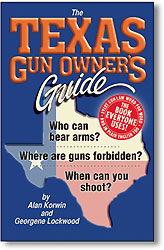
| Home | Books | National Directory | Position Papers | Alan’s Blog | FAQ | New Stuff | Search |
|
"APPROVED BY THE
TEXAS DEPT. OF PUBLIC SAFETY
FOR USE IN CONCEALED HANDGUN LICENSE TRAINING." |
UPDATES
THE TEXAS GUN OWNER'S GUIDE Updates for 2003-2004
Changes to Edition 5 for the year 2003 and 2004 (Posted 10/04) Click here for a pdf version of 2003-2004
that will fit neatly into your book.
Texas Enacts Motorhome Gun Rights (HB 284)
Bill Number: SB 103
Bill Number: SB 117
Bill Number: HB 284
Bill Number: SB 501
Bill Number: HB 1704
Bill Number: HB 3477
|
||
 on gun laws and other topics.
|


